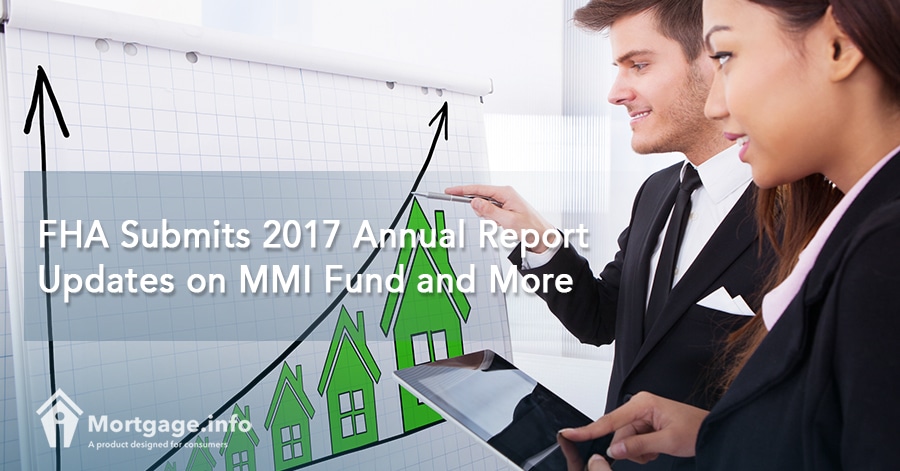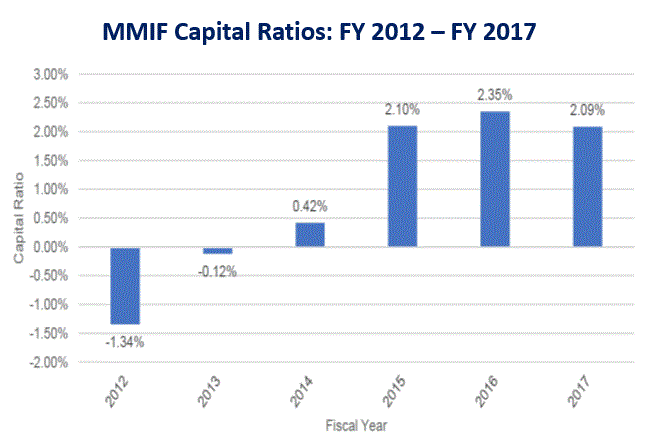“Our duty is clear – we must make certain FHA remains financially viable so future generations can build wealth and climb the economic ladder of success,” Dr. Ben Carson, secretary of the HUD, said in a public statement accompanying the FHA’s annual report to Congress for 2017.
The Federal Housing Administration or FHA updated the U.S. Congress on the health of its mutual mortgage insurance fund that supports the agency’s popular single-family loans and reverse mortgages for seniors.
In its Annual Report to Congress for fiscal year 2017, the FHA detailed the health of its MMI Fund that is well above its statutory required levels, the performance of forward and reverse mortgages, and the impact of the mortgage insurance reduction had it happened.
MMI Fund Financial Health
Source: FHA/HUD
“The fiscal health of FHA demands our constant attention and vigilance to ensure we can continue providing sustainable homeownership opportunities to working families without exposing taxpayers to excessive risk,” Dr. Ben Carson said.
Pursuant to the National Affordable Housing Act of 1990, the FHA is required to maintain a capital ratio to gauge the MMI Fund’s financial status. This capital ratio has a two-percent threshold.
To calculate the capital ratio, the MMI’s economic net worth is divided by the dollar balance of active loans insured by the FHA, namely single-family forward mortgages for purchase and refinance and the reverse mortgage program called Home Equity Conversion Mortgages (HECMs).
As of FY 2017, the MMI Fund has an economic net worth of $25.6 billion, a decrease of $1.9 billion from $27.6 billion in FY 2016. This net worth is comprised of total capital resources – $39.7 billion and a negative cash flow NPV of $14.1 billion.
The FHA’s Insurance-in-Force or IIF, which represents the outstanding balance of an active loan, totaled $1.23 trillion by the end of FY 2017 — an increase of 4.8% from FY 2016.
Consequently, FY 2017’s capital ratio is 2.09%, down from 2.35% in the preceding year. Nevertheless, the current capital ratio remains above the levels required by law for three straight years now.
2017 FHA Loans in Numbers
During the relevant period, the agency endorsed 1,246,440 forward mortgages, including 882,079 purchase loans, with a total Unpaid Principal Balance of $251 billion.
An overwhelming number of FHA purchase loans or 82% were made to first-time homebuyers during the fiscal year (752,102).
The average FHA forward mortgage was $201,337. In FY 2017, the credit scores of borrowers taking FHA loans averaged 676, down from 680 in the preceding fiscal year.
Forward Mortgages vs Reverse Mortgages
The FHA found that its forward mortgage portfolio is performing materially better than its HECM portfolio during the relevant period. “As previously noted, the HECM portfolio has been a substantial economic drain on the MMI Fund,” the agency said.
For instance, the single-family forward mortgages had a capital ratio of 3.33%, had an economic net worth of $38.4 billion, and contributed $4.2 billion to the MMI Fund.
These positive numbers are countered by the HECMs’ capital ratio of (19.84%) and economic net worth of ($14.5 billion). It can be recalled that the FHA has made improvements to the program, which changes the agency expects to see in the program’s performance next year.
Nevertheless, the FHA saw a 13.1% increase in the number of HECM endorsements totaling 55,291 in FY 2017. The maximum claim amount of these endorsed reverse mortgages totaled $17.7 billion — a 20.3% increase from FY 2016.
Claims on HECMs have also been on the rise, increasing to $5 billion in FY 2017, up from $4.2 billion paid in the preceding year. This resulted in the program having a net cash flow of (5.07%) of HECM’s average IIF during the relevant period.
Impact of Mortgage Insurance Premiums (Reduction)
In January, the FHA announced a rollback on its mortgage insurance premiums meant to save households $500 a year that was soon taken back and suspended indefinitely by Pres. Trump.
For this, the FHA said:
“The 2017 Annual Report concludes that had this premium reduction taken effect in January, the MMI Fund’s Capital Ratio would have fallen 1.76% (below the statutory minimum) resulting from a net reduction in cash flows of $3.2 billion and an increase in IIF of $45 billion.”


